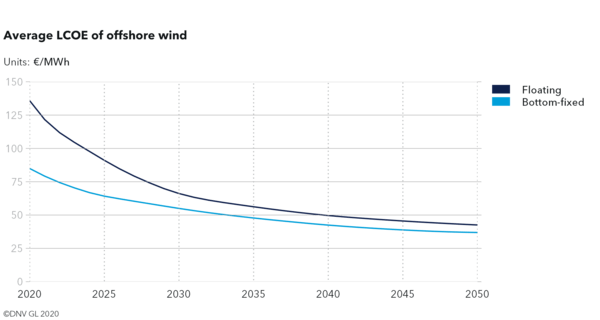News Release from DNV
Wind Industry Profile of
Floating wind power to grow 2000-fold by 2050 but more comprehensive standards and risk management required – report
According to a new report by risk management and quality assurance company DNV GL, the cost of floating wind will fall approximately 70% by 2050 (to a global average of 40 EUR per MWh.) and offer new opportunities to players in the offshore wind, oil & gas and maritime industries as they shift their portfolios to become less dependent on fossil fuels.
DNV GL has played a central role in creating and implementing many of the rules and standards that have helped the maritime, oil & gas and offshore wind (fixed) industries operate and grow safely. The report documents how learnings from established offshore industries will be important for floating wind. In particular, standardization and risk management will be essential to build stakeholder confidence.

Levelized cost of energy (LCOE) for floating wind will go down to a global average of 40 EUR per MWh in 2050. (Image: DNV GL Energy Transition Outlook)
“We know that floating wind is technically feasible; the challenge now is to move rapidly to commercial deployments,” says Remi Eriksen Group President & CEO of DNV GL. “There is a wealth of expertise to call on. The know-how from bottom fixed offshore wind, the competences of shipyards, and of oil and gas contractors all broadly align with the technical, logistical and operational challenges of floating wind.”
As part of the in-depth analysis of the global energy landscape published in its recent Energy Transition Outlook 2020, DNV GL forecasts a strong future scenario for floating wind energy. Its model predicts that the installed capacity of floating wind will grow from 100 MW today to 250 GW in 2050. Or in other words, a 2000-fold increase. Unrestrained by ocean depth, it will be an especially attractive option to bring wind power in reach of much more of the world’s population including the mega cities of Asia Pacific. Although the average cost is not expected to become less than for bottom-fixed wind, the price difference will narrow as both fall. Key to these savings will be the introduction of larger turbines, larger wind farms, significant technology developments and the creation of a highly cost-competitive supply chain.
Magnus Ebbesen, Floating Wind Lead at DNV GL said: “There is a lot of room for innovation and optimization, but also for brand new solutions. That brings some risk, but risks that can be managed and minimized. With an evolving technology, flexibility and forward thinking are imperative. Get it right, and floating wind presents a very attractive opportunity with healthy returns – for investors and the planet.”
Having been involved in the floating wind market since the very beginning, the report covers in detail the insights and experiences of DNV GL’s experts on the following topics:
- How floating wind will boost the energy transition
- How cost reductions can be achieved
- Developments in key markets
- How to bring comfort for investors
- The importance of standards to mitigate risks
- Solutions for yards to achieve cost-effective floating wind construction
- The need of digital innovation to handle the technology’s complexity
- Knowledge transfer from oil and gas projects
Download the report here.
- Source:
- DNV GL
- Author:
- Press Office
- Link:
- www.dnvgl.com/...
- Keywords:
- DNV GL, report, floating, increase, industry standard, risk management, standard, technology, scale, offshore, marine

























